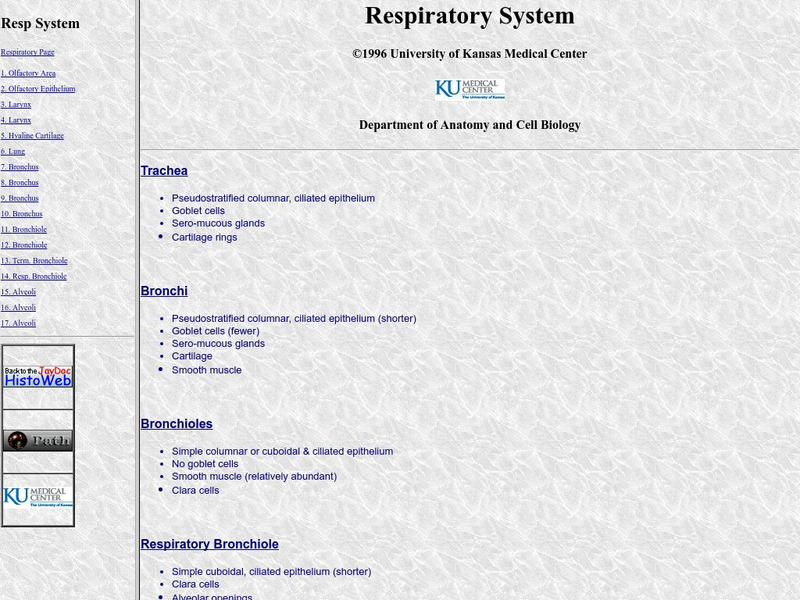Teach Engineering
Abdominal Cavity and Laparoscopic Surgery
Get to know the human body from the inside out. The first lesson plan in a series of 10 introduces the class to the abdominopelvic cavity. Biomedical engineers need to understand the region of the body as they develop and improve...
Curated OER
Human Anatomy- How Do We Move?
Students explore the human anatomy. In this respiratory system lesson plan, students conduct an experiment to simulate the capacity of human lungs.
Curated OER
The Human Body: An Introduction
In this human body worksheet, students match 10 terms with their definitions, they answer 21 multiple choice questions, and label a diagram. They fill in 21 blanks with the appropriate given terms and answer 5 questions. Topics include...
Curated OER
Hands on Your Heart - Biology Teaching Thesis
Learners are able to recite the circulation of blood through the heart's various cavities and valves. They are able to appreciate what the actual valves and chambers of the heart look like. Students also have a clear vision of why the...
Curated OER
Anatomy Review
For this biology worksheet, learners examine the internal functions of the human body while considering the factors needed to explain the physiological reactions.
Curated OER
Anatomical Position & Directional Terms
Simple lists of anatomical terms fill the slides in this collection. It begins by explaining the general anatomic position and then goes into directional, body plane, and body cavity terms. The separate regions are categorized as head,...
Curated OER
Fetal Pig Dissection
In this dissection worksheet, students use a preserved fetal pig to learn more about anatomical terms and body systems. Detailed diagrams and instructions are provided to guide the students through the dissection. Students complete...
Curated OER
The Language of Anatomy
Students review the concept of anatomical directions. In pairs, they label each other according to those directions and label a diagram of themselves with the directions as well. They participate in a game of "Simon Says" to review the...
Curated OER
Tissues
Complete with teachers' notes for most of the slides, this is a tremendous presentation of the four types of tissues: epithelial, connective, nerve, and muscle. Each is displayed with pertinent vocabulary and photos of microscope slides...
Biology Junction
Dissection of the Clam
Is the structure of a clam really as simple as it seems? Young scholars explore the anatomy of the clam in an engaging lesson presentation. The lesson highlights the digestive process of the clam as well as how it moves and what it does...
Teach Engineering
Designing a Robotic Surgical Device
The engineering design process meets laparoscopic surgical robots with an activity that is the last part in a series of 10 and brings all the lessons of the unit together. Teams design and build a remotely controlled laparoscopic device....
Biology Junction
Flatworms
In this flatworms instructional activity, learners identify and color the different parts of a flatworm. They complete 14 short answer questions related to the topic.
Curated OER
How Does Radon Affect Human Lungs?
Students identify the different parts of the respiratory system of the human body. They work together to complete an activity and worksheet about the effects of radon on the lungs. They research lung diseases if time permits.
Curated OER
Geometry: Practical Applications of the Distance Formula
Students, working independently and in groups, apply the distance formula to practical situations. After solving various problems, students in pairs design coordinate planes from the school blue print to measure the distance from the...
OpenStax
Open Stax: Anatomy & Physiology: Anatomical Terminology
This site provides learners with information regarding anatomical terminology. It covers anatomical position, directional and regional terms used, body planes, body cavities and their organs, and the serous membranes.
Other
Get Body Smart: Respiratory System: Anatomy and Physiology
Students can learn about the human respiratory system's structures and functions through this easy-to-access tutorial. Sections include major zones and divisions, the nose and nasal cavity, the pharynx, the larynx, the trachea and...
BBC
Bbc: Applied Anatomy and Physiology: Muscles and Movement
Learn what muscles are, how they are classified, and how they are attached to the body's skeletal system. This site contains several definitions, illustrations showing the parts of muscles, and a quiz to test your knowledge of muscles...
PBS
Pbs Learning Media: Amazing Heart Facts
This feature from the NOVA: "Cut to the Heart" highlights facts about the heart, including its size and placement, and will help you to understand the importance of this wondrous organ in our bodies.
TeachEngineering
Teach Engineering: Abdominal Cavity and Laparoscopic Surgery
For students interested in studying biomechanical engineering, especially in the field of surgery, this lesson serves as an anatomy and physiology primer of the abdominopelvic cavity. Students are introduced to the abdominopelvic...
TeachEngineering
Teach Engineering: Polluted Air = Polluted Lungs
To gain a better understanding of the roles and functions of components of the human respiratory system and our need for clean air, students construct model lungs that include a diaphragm and chest cavity. They see how air moving in and...
University of Kansas Medical Center
University of Kansas Medical Center: Respiratory System
What do you know about the respiratory system? Check out this site to learn more about this fascinating body system. This resource features slides of the different parts of this system.


















